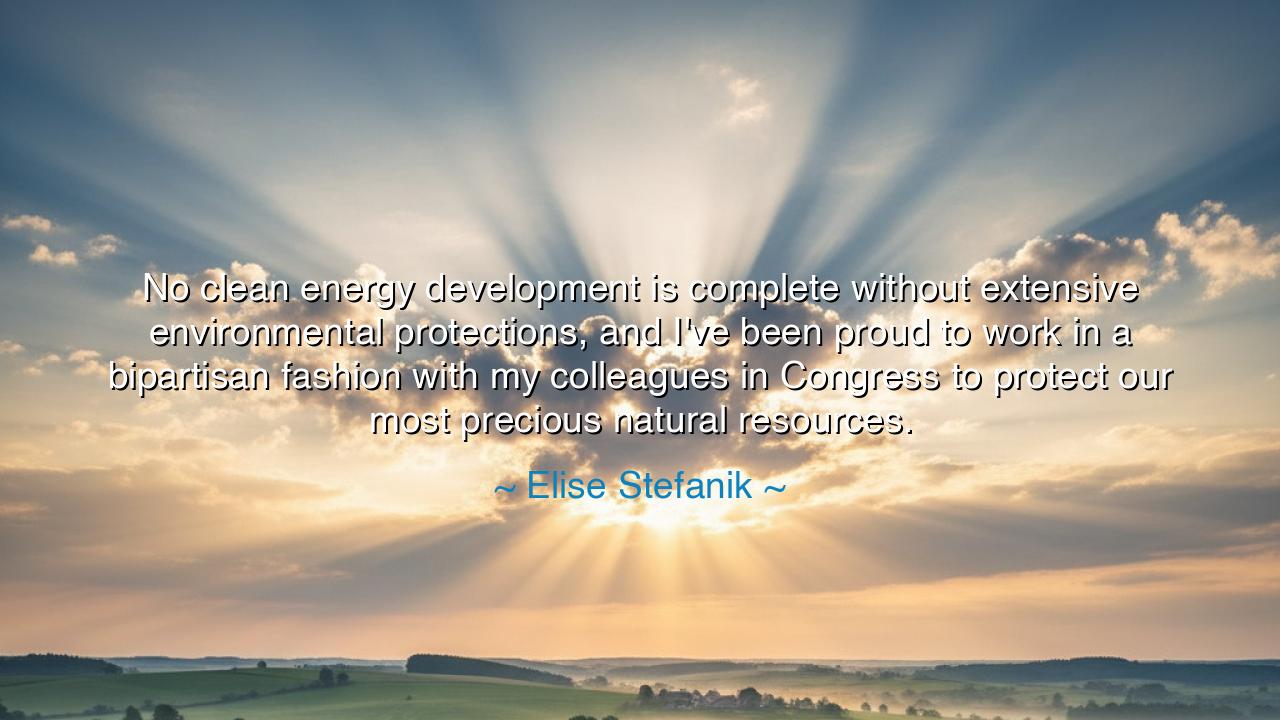
No clean energy development is complete without extensive
No clean energy development is complete without extensive environmental protections, and I've been proud to work in a bipartisan fashion with my colleagues in Congress to protect our most precious natural resources.






In a voice tempered by both conviction and care, Elise Stefanik once declared, “No clean energy development is complete without extensive environmental protections, and I've been proud to work in a bipartisan fashion with my colleagues in Congress to protect our most precious natural resources.” Beneath the calm of these words lies the pulse of an ancient truth—the balance between creation and preservation, between innovation and restraint. For what good is progress, if it comes at the cost of the earth that sustains us? Stefanik’s statement is not merely a political reflection; it is a moral creed, a reminder that the pursuit of energy and prosperity must walk hand in hand with reverence for the natural world.
The origin of this quote lies in Stefanik’s work as a member of the United States Congress, where she has often championed policies that bridge the divide between economic growth and environmental guardianship. In a time when debates over energy—fossil fuels, renewables, nuclear, and solar—often divide nations, she speaks of bipartisanship, of working not as factions but as stewards. Her belief that clean energy development cannot exist without environmental protections reveals an understanding that progress, untempered by responsibility, becomes destruction. Her words, therefore, belong not only to politics but to the ancient lineage of those who sought harmony between human ambition and the eternal rhythms of nature.
To the ancients, this harmony was sacred. The philosophers of Greece and the sages of China both warned that imbalance leads to ruin. The Greeks spoke of hubris—the arrogance that arises when mortals forget the boundaries of their power—and how it inevitably calls forth nemesis, the retribution of nature. The Taoists, on the other hand, taught that all things exist in balance, and that to push too hard against the natural order is to invite collapse. In this light, Stefanik’s wisdom is a modern echo of timeless counsel: that energy, though vital to civilization, must flow in accord with the laws of the earth, not in defiance of them.
When she speaks of protecting our most precious natural resources, she calls to mind the long history of humanity’s covenant with the land, the rivers, the air, and the forests. Consider the story of the Tennessee Valley Authority (TVA), born during the Great Depression—a grand vision of clean power and social renewal. The TVA transformed barren lands into thriving farms and electrified rural America, but it also scarred rivers and displaced communities. The lesson of that era was profound: progress without protection carries a heavy cost. Decades later, when the United States passed the Clean Air Act and the Clean Water Act, it was an acknowledgment that development alone cannot define greatness. Only when technology is guided by conscience does civilization truly advance.
Stefanik’s emphasis on bipartisan cooperation carries another deep truth: that the care of the planet is not the work of one party, one nation, or one age, but the shared responsibility of all humankind. The earth recognizes no political boundary; the wind and the water carry the consequences of neglect across every shore. Thus, her call for unity is not merely strategic—it is spiritual. It asks leaders to remember that before we are citizens of nations, we are children of the same soil. As ancient Rome thrived when senators put the Republic above self, so too will modern civilization endure only when leaders place the planet above pride.
The heart of her quote—the phrase “no clean energy development is complete”—reminds us that innovation, though dazzling, is incomplete without virtue. Humanity’s history is filled with inventions that lifted it to new heights, yet also threatened its foundation. The discovery of fire gave warmth but also wrought destruction; the mastery of the atom promised boundless energy but birthed the specter of annihilation. So it is with energy today: solar fields and wind farms, if built carelessly, can scar landscapes; biofuels, if harvested greedily, can consume forests. Thus, the measure of success lies not in what we create, but in how we preserve what creation gave us.
Let this be the lesson passed down to future generations: that progress without wisdom is peril, and protection without action is empty promise. Each citizen, not only each leader, has a part to play in the stewardship of the earth. Plant trees where there is barren ground. Conserve water where it flows freely. Demand policies that honor both innovation and integrity. For the health of the planet is not a distant issue—it is the mirror of our own soul.
So remember, children of tomorrow: clean energy is not merely a triumph of technology, but a moral covenant with the earth. As Elise Stefanik teaches, it is not enough to build power—we must also preserve purity. The rivers, the forests, and the winds are not resources to be spent, but blessings to be guarded. And when humanity learns once again to unite in their defense, we will not merely generate energy; we will generate hope—a light that shines not only through wires and turbines, but through the hearts of those who choose balance over conquest, and wisdom over waste.






AAdministratorAdministrator
Welcome, honored guests. Please leave a comment, we will respond soon